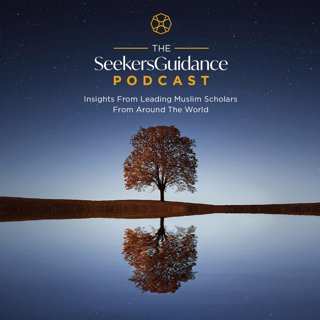
04- Being Productive in Seclusion- Shaykh Sadullah Khan
In this fourth episode, Shaykh Sadullah reminds us of the importance of being optimistic whilst we are in seclusion. Pessimism stifles creativity and productivity. By adopting a positive outlook we will be able to develop our creativity. For more SeekersGuidance podcast shows, visit seekersguidance.org/podcasts. Help SeekersGuidance reach millions around the world through reliable knowledge and guidance from qualified scholars, completely free: become a monthly supporter – www.seekersguidance.org/donate
30 Mars 20202min

03- Loneliness- Shaykh Sadullah Khan
In this third episode, Shaykh Sadullah discusses the notion of loneliness. As human beings, we are social creatures and therefore welcome social interaction. However, being isolated from others can have a great impact on us emotionally and psychologically. By appreciating personal seclusion we can enhance our own personal development and creativity. For more SeekersGuidance podcast shows, visit seekersguidance.org/podcasts. Help SeekersGuidance reach millions around the world through reliable knowledge and guidance from qualified scholars, completely free: become a monthly supporter – www.seekersguidance.org/donate
29 Mars 20202min

02-Adjusting to Restriction-Shaykh Sadullah Khan
In this second episode, Shaykh Sadullah asks us to reflect on what freedom really means. Many of us have been restricted to our homes due to the Covid-19 pandemic and this can cause a sense of anxiety and fear. Whilst we might think that our freedom has been curtailed, we should remember that freedom is always linked to moral obligations and social responsibility. For more SeekersGuidance podcast shows, visit seekersguidance.org/podcasts. Help SeekersGuidance reach millions around the world through reliable knowledge and guidance from qualified scholars, completely free: become a monthly supporter – www.seekersguidance.org/donate
28 Mars 20201min

01- Now is the Time to Reflect- Shaykh Sadullah Khan
Over the next 21 days, Shaykh Sadullah Khan will share daily messages of introspection, motivation, and inspiration so that we are able to deal with the current global pandemic Covid-19. In this 1st episode, Shaykh Sadullah asks us all to reflect on what is happening around us. Whilst we are all at a standstill, we have an opportunity to think about who we are as human beings and how we can become better individuals moving forward. If God wills for us to overcome this crisis, it is imperative that we learn from our past mistakes and ensure that we become more upright, ethical and compassionate human beings. For more SeekersGuidance podcast shows, visit seekersguidance.org/podcasts. Help SeekersGuidance reach millions around the world through reliable knowledge and guidance from qualified scholars, completely free: become a monthly supporter – www.seekersguidance.org/donate
27 Mars 20203min

Seeking Protection with His Name- Shaykh Yahya Rhodus
In response to the fear and concern brought about by the recent spread of the Covid-19 virus, Shaykh Yahya Rhodus reminds us of the importance of seeking protection with Allah's Name. In this important and timely reminder, Shaykh Yahya comments on the following prophetic duʿa (supplication) and encourages everyone to recite it daily: بِسْمِ اللهِ الَّذِي لَا يَضُرُّ مَعَ اسْمِهِ شَيْءٌ فِي الْأَرْضِ وَلَا فِي السَّمَاءِ وَهُوَ السَّمِيعُ الْعَلِيمُ “In the name of Allah, with Whose name nothing on earth or in heaven can harm—He is the All-Hearing and All-Knowing.” For more information on Al-Maqasid's programs, please visit www.almaqasid.org
24 Mars 202014min

Dealing with the Coronavirus – Mufti Taha Karaan
In this talk, Mufti Taha Karaan provides a conceptual approach in understanding the phenomenon of a communicable disease in relation to religious law, creed and daily activities of living. The COVID-19, which has now been classified as a pandemic, has caused much societal confusion and panic. Many countries have declared national states of emergency. As Muslims, we should ensure that we are cognizant of how our religion advises us in taking practical precautions in safeguarding our health and well-being. Additionally, we should be cautious not to misinterpret the events around us as a divine punishment. Furthermore, Mufti Taha Karaan discusses the impact of a communicable disease on Islamic jurisprudence and religious societal obligations. For more SeekersGuidance podcast shows, visit seekersguidance.org/podcasts. Help SeekersGuidance reach millions around the world through reliable knowledge and guidance from qualified scholars, completely free: become a monthly supporter – www.seekersguidance.org/donate
16 Mars 202024min

What is true wealth in Islam? – Shaykh Faraz Rabbani
"Wealth is not through a lot of possessions," said the Prophet (Allah bless him and give him peace). "Rather, wealth is only wealth of spirit." [Related by Ahmad and others ; sound] Shaykh Faraz Rabbani explains the neediness (faqr) of humans, and how the desire to amass--wealth and possessions--is a natural impulse. However, no worldly amassing ultimately matters. On the Day of Reckoning, all that matters is coming to Allah with a sound heart. Shaykh Faraz explains this Prophetic hadith, and shares three signs of a sound, healthy, wealthy heart and spirit. For more SeekersGuidance podcast shows, visit seekersguidance.org/podcasts. Help SeekersGuidance reach millions around the world through reliable knowledge and guidance from qualified scholars, completely free: become a monthly supporter – www.seekersguidance.org/donate
7 Feb 202023min

Flying With Faith Cultivating: Hope and Awe of Allah-Shaykh Faraz Rabbani
If we love Allah, why do we fear Him? Shaykh Faraz Rabbani explains that "fear" (khawf) of Allah is having reverential awe of the Greatness of our Merciful Lord and His tremendous favor upon us. Likewise, hope isn't just wishing for the good. "Hope and fear are the wings of faith," said Imam Ghazali."By them, the seeker flies to the stations of Closeness with Allah." Shaykh Faraz explains the meaning of hope (raja’) and awe (khawf), with reference to key verses of the Quran. And he shares insights on how to focus our consciousness to acquire and cultivate true hope and awe--by letting go of attachments to the past and too distracting or useless things--so we can attain the Eternal Pleasure of Allah and His Paradise: "And as for the one who is in awe of the station of their Caring Lord and who restrains their lower self from its wayward ways, then Paradise is indeed their resting place." Surat An-Nazi'at: 40-41
10 Jan 202024min





















